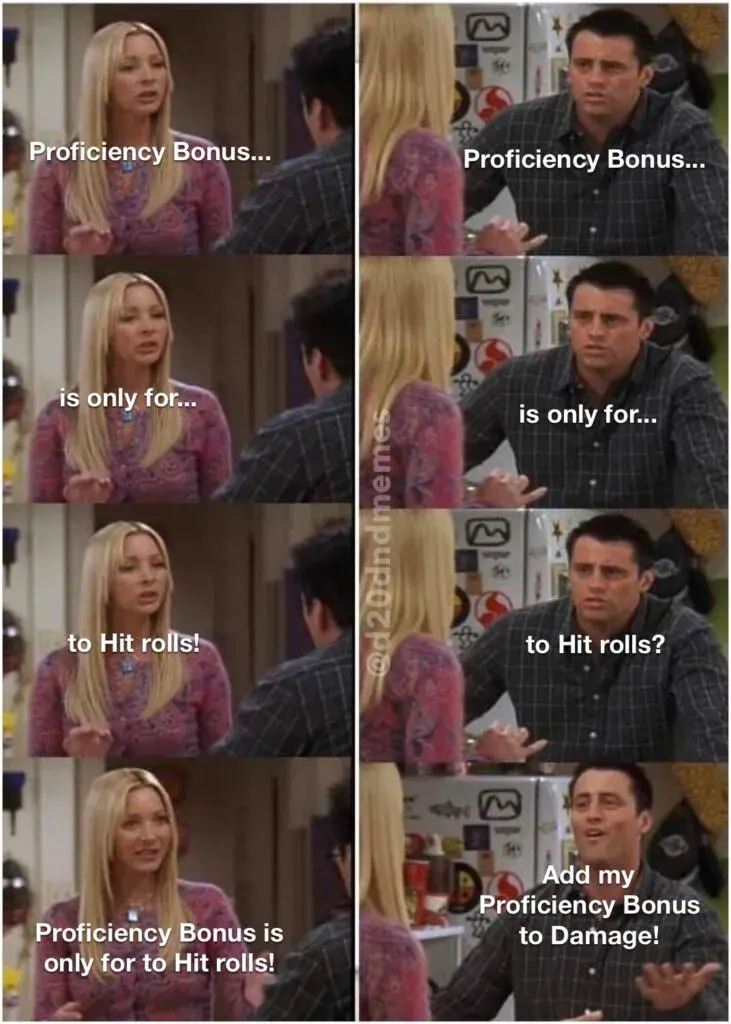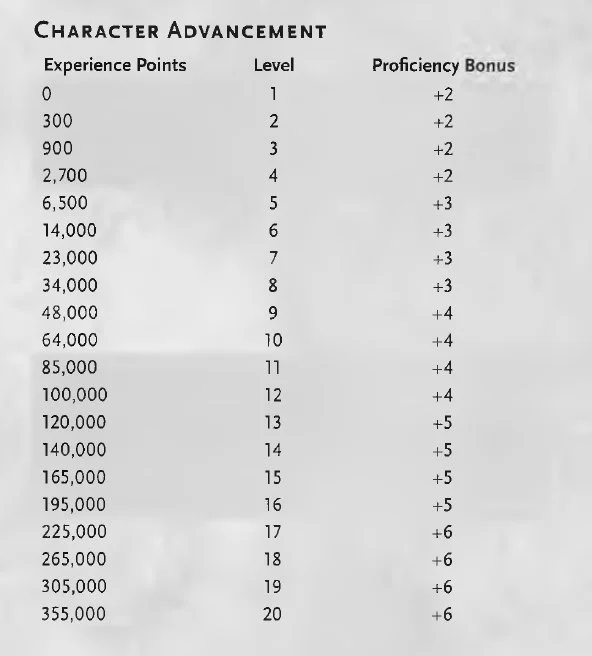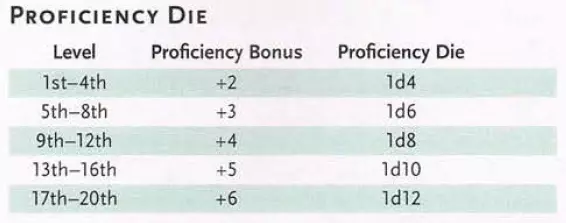The Proficiency Bonus (PB) in D&D 5e is one of the critical elements you must consider while you are playing. Still, it is undoubtedly also an enigmatic bonus when you approach the Game for the first time, especially if you come from other different tabletop games.
In this small guide, we will try to guide you on where do you have to use it and how you can calculate it.
What is the Proficiency Bonus (PB) in DnD 5e?
The Proficiency Bonus (PB) is the bonus (the fixed number) that you have to add to all the checks that your character is proficient in; it is used to create a baseline that expresses the level of expertise of a D&D character, according to its level, its class, and its race.
These checks are:
- Skills checks (Acrobatics, Athletics, etc.)
- Saves Throws (Strenght, Constitution, Wisdom, etc.)
- Melee Weapons, Ranged Weapons, and Spell attacks
- Defensive Class (DC) for spells and skills.
As mentioned before, the Proficiency Bonus is always linked to your total character level and shown in a specific Table, called the Character Advancement Table.
The total character level is different from the level in a particular class. This aspect is very important in creating a multiclass character, combining different classes and levels. For example, if your character is multiclass between a Fighter Level 3 and a Barbarian Level 2, your total character level is 5 (3 +2 = 5) and your proficiency bonus is +3.
This particular type of bonus starts at a value of +2 and increases every 4 levels to a maximum value of +6 for the player (+9 for monsters, which have their own proficiency bonus determined by their Challenge Rating).
When do you use the Proficiency Bonus?

As mentioned before, you have to add this bonus on most of the checks involving a level of character expertise. According to the class you selected for your PC, you will have different proficiency levels, both in using tools and in your physical/intellectual abilities: this means that your character has either trained during his/her life on a particular set of skills or has a natural talent for those (or a combination of both).
The logic behind the PB is that characters have developed different abilities in their life, which are reflected both in their classes (with the proficiencies you select in the PC’s creation), and in their level (with an increase in the PB modifier).
Let’s consider this example, to see how we apply this bonus to a typical game.
You have a Level 3 Human Barbarian, with a Strenght of 18 (which equals a modifier of 4), who has just made a roll of 10 of an Athletic Check.
Let’s suppose that when you have created the PC you have selected, among the various possibilities, the proficiency in Athletics.
In this case, the result of your check will be the following:
10 (base roll) + 4 (strength modifier) + 2 (proficiency bonus modifier) = 16
Consider that for every throw, you must apply the Proficiency Bonus only ones, even if your character has multiple proficiencies that might help him/her in this situation.
The only exception to this rule is when your PC is “expert“: in this case, you must make the same calculation as before, but double the Proficiency Bonus modifier.
How do you Calculate the 5e Proficiency Bonus (PB)?
Characters in Dungeons and Dragons can have their knowledge and abilities classified in 3 groups, depending on how skilled they are in these skills:
- Base level skills (not-proficient): your character will know a great number of skill on a base level, or sometimes even might have some difficulties with them. These abilities are calculated using the modifier that comes from the related abilities (ex. the survival skill is related to Wisdom, so it depends from the Wisdom modifier)
- Proficient level skill: between all of them, there is a small group of abilities in which you are more capable to do pretty well (it is told that your character is “proficient” in these abilities)
- Expert level skills: rarely, your character is particularly good at these (your are an “expert” in these).
In all these cases, the proficiency bonus has an impact more significant than you can imagine at a first glance. Since your character can not have Ability scores that go beyond the +5 (since your characteristics can not cross level 20), the Proficiency Bonus in DnD 5e (usually) makes the highest impact on the bonus you will add on every throw that involves your characteristics, especially on higher levels.
The formula you have to follow to calculate the Proficiency Bonus in DnD 5e is the following:
[2 + (Total level of character -1)/4] (rounded down)
or
1 + (total level of character)/4 (rounded up)
You will have the same results in both cases, so you can choose the one you prefer.
THE CHARACTER ADVANCEMENT TABLE
However, as mentioned before, you will not have to use these formulas unless you plan to homebrew a class beyond Level 20. In all the other cases, you will need to use the character advancement table, which you can find right below and shows you how the PB increases with your level

Quick note: the proficiency bonus for Monsters and Creatures has been pre-added to all the rolls that use it until Tasha’s Caldron of Everything.
Is there an alternative to the Proficiency Bonus?
If you wnat to add more randomness to your game, you can decide to use this pretty unknown mechanic, that will increase the level of “uncertantly” of the outcome of the actions of the party’s characters. This mechanic is know as “Proficiency dice“
The Proficiency Dice is applied to your throws in the same way as the standard Proficiency Bonus, but instead of using fixed numbers, it uses dice rolls. Its progression increases the same way as the PB, starting with a 1D4 and then gradually increasing to a 1D6, then 1D8, 1D10, and finally to a 1D12.
Even though it adds more unpredictability to your game (if you decide to use your system, your saving throws can be really hard or really easy), it can often lead to chaos and time expenses.
You can still try to use it if you are playing to a Virtual Table Top: it might be easier to do all these rolls in these cases.

Here is a table on how to use the proficiency die.
And Using the Example we made before, here is how you will calculate the result on a Strenght Check using this mechanic.
In this case, we will assume that:
- Our character is a Level 4 character (Proficiency die: 1d4)
- We roll a 10 with the D20 die
- The character has STR level equal to 18
- We have rolled a Proficiency die and the outcome was 2
10 (base roll) + 4 (strength modifier) + 2 (result of the Proficiency Die) = 16
As we can see, the results in this simulations are the same, but there is more variability, since we have to account both the results of the Base Roll and the result of the Proficiency Die.
Further Readings
OTHER ARTICLES
- Learn more about Cone AOE Spells
- Discover more about how to use it to create DnD monsters
- Discover the 12 most powerful 5e AOE Spells
Credits
- Some other suggestions for the Proficiency Bonus
- Start with Dungeons and Dragons
- Learn how to create Homebrew Creatures in DnD 5e
- The Source we use for the PB Meme
 Skip to main content
Skip to main content

